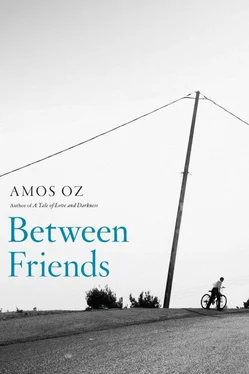Moshe said, “Goodbye, Father.” Then he said, “I’ll see you soon. Don’t worry.”
From the door, he gave a last look at his father, who was sitting utterly still, staring at the tin mug. On the way out, Moshe asked the supervisor in the army trousers, “How is he?”
The supervisor said, “He’s fine. Quiet.” Then he said, “I wish they were all like him,” and finally added, “You’re a very good son. Bless you.”
When he left, it was almost dark outside. Moshe was suddenly filled with that familiar sense of self-loathing. He took his black beret off and put it in his bag. He rolled his sleeves up to his biceps again and undid his top button. Only thorns and couch grass grew in the small front garden of the hospital. But someone had forgotten a dishtowel on the bench and someone had lost the belt to his robe among the thorns. Moshe noticed those details because he was drawn to details. He thought about Cheska Honig, who had taught him to keep an eye out for sick hens and isolate them before they infected the whole coop. And he thought about his classmates lying on one of the lawns now, the boys’ heads resting on the girls’ laps as they sang nostalgic songs. One of them, Tamir or Dror or Gideon or Arnon, was now putting his blond head on Carmela Nevo’s lap, its heat caressing his cheek. Moshe would give everything he had to be there now. Once and for all to be one of them. And yet he knew very well that it would never happen. As he walked through the gate, the jovial guard asked, “What’s this, you go in with a hat on and come out without it?”
Moshe said only good night and turned onto the dirt path that led from the hospital to the road. It was dark and empty. Not a single car drove past. Pinpoints of light shone in the distance and he could hear the braying of a donkey. The faint voices of children also came from the direction of the lights. He kneeled on the ground and sat back on his legs at the foot of the whitewashed eucalyptus tree, close to where he had laid the run-over dog, and waited. He waited for a long time. He thought he could hear sounds of jagged weeping coming from the hospital, but he wasn’t sure. He sat there motionless, and listened.
LEAH, HIS WIFE, had gone off to attend a ten-day course at the Kibbutzim College of Education that would train her to be a caregiver in the children’s house. Roni Shindlin was happy to have a few days without her. He showered after his shift in the metalwork shop and at four in the afternoon went to the children’s house to pick up his five-year-old son, Oded. On the days it wasn’t raining, he held Oded’s small hand and they went for a stroll around the kibbutz. Oded wore green boots, flannel trousers, a sweater, and a jacket. Roni always tied the strings of the boy’s hat under his chin because his ears were sensitive to the cold. Then he picked him up, hugged him, and took him to see the cows and the sheep. Oded was afraid of the cows, which wallowed in wet dung and mooed faintly from time to time. His father recited for him: “‘I never saw a purple cow/I never hope to see one/But I can tell you anyhow/I’d rather see than be one.’”
Oded asked, “Why is it roaring?”
Roni explained, “Cows don’t roar. Cows moo. Lions roar.”
“Why do lions roar?”
“They’re calling their friends.”
“Their friends are mean.”
“Their friends play with them.”
“They’re mean.”
Oded was a short little boy, slow and always frightened. He was often sick: he had diarrhea almost every week, and in winter he had ear infections. The children in his kindergarten tormented him constantly. He spent most of the day sitting alone on a mat in a corner, his thumb in his mouth, his back to the room, and his face to the wall, playing with wooden blocks or a rubber duck that squealed mournfully when you squeezed it, and he squeezed it all the time. He’d had it since he was a year old. The children called him Oded-pees-his-bed and when the caregiver turned her back, they pulled his hair. He cried softly for hours, snot running down to his mouth and chin. The caregivers didn’t like him either because he didn’t know how to stand up for himself, or because he wouldn’t play with the others and he cried so much. At the breakfast table, he would pick at his porridge and leave most of it in the bowl. When they scolded him, he cried. When they tried to coax him into eating, he withdrew into himself and was silent. Five years old, and he still wet his bed every night, so the caregivers had to spread a rubber sheet under the regular one. He got up wet every morning and the children made fun of him. He would sit barefoot in his wet pajamas on his wet bed, his thumb in his mouth, and instead of trying to change into dry clothes, he’d cry quietly, the snot mingling with his tears and smearing his cheeks, until the caregiver arrived and scolded him, “Oh, really, get dressed, Oded. Wipe your nose. Enough crying. Stop being such a baby.”
The Committee for Preschoolers instructed Leah, his mother, to be firm with him in order to wean him off this self-indulgent behavior. And so, during the afternoons he spent at his parents’ house, Leah saw to it that he sat with his back straight, always finished everything on his plate, and never sucked his thumb. If he cried, she punished him for being a crybaby. She was against hugging and kissing, believing that the children of our new society had to be strong and resilient. She thought Oded’s problems stemmed from the fact that his teachers and caregivers let him get away with things and forgave him his oddities. Roni, for his part, hugged and kissed Oded only when Leah wasn’t around. When she was gone, he’d take a bar of chocolate out of his pocket and break off two or three squares for Oded. Father and son kept those squares of chocolate a secret from Leah and everyone else. More than once, Roni had intended to take issue with Leah about how she treated their son, but he feared her angry outbursts, which drove Oded to crawl under the bed with his duck and cry soundlessly until his mother’s anger subsided — and even then, the boy was in no hurry to leave his hiding place.
On the kibbutz, Roni Shindlin was considered a gossip and a comedian, but in his own home, he hardly ever joked because Leah couldn’t stand his wisecracks, which she found coarse and tasteless. Both Leah and Roni chain-smoked the cheap Silon cigarettes the kibbutz distributed to its members, and their small apartment was always full of smoke. The smell persisted even at night because it had been absorbed by the furniture and the walls and hovered under the ceiling. Leah didn’t like unnecessary touching and talking. She believed in solid principles. She adhered to all the kibbutz tenets with a zealot’s fervor. In her view, a couple on the kibbutz should live a simple life.
Their apartment was furnished with a plywood bookcase and a sofa with a foam rubber mattress that opened into a double bed at night and was closed again every morning. There were also a coffee table, two wicker armchairs, an upholstered armchair, and a rough floor mat. A painting of a field of sunflowers glowing in the sun hung on the wall, and a mortar shell casing that served as a vase for a bouquet of dry thorns stood in the corner of the room. And, of course, the air reeked of cigarettes.
In the evening, after the work schedule for the next day had been hung on the bulletin board, Roni liked to sit with his friends and acquaintances at his regular table at the far end of the dining hall, smoking and talking about the goings-on in the kibbutz members’ lives. Nothing escaped his notice. Other people’s lives aroused his unflagging curiosity and unleashed a torrent of witticisms. He thought that the higher our ideals, the more absurd our weaknesses and contradictions. Sometimes, with a smile, he quoted Levi Eshkol, who said that a person is only human, and even that, only rarely. He would light himself a fresh cigarette and say to his cronies in a slightly nasal voice, “Some people play musical chairs, but here, we play musical mates. First Boaz ups and leaves Osnat for Ariella Barash, and now Ariella ups and leaves Boaz for her cat and tomorrow some newly abandoned woman will come and collect the newly abandoned Boaz. In the words of the Bible: ‘I have not seen the righteous forsaken or his children begging for… a warm bed.’” Or he’d say, “Anyone on Kibbutz Yekhat who needs a wife can just stand in line at the bottom of David Dagan’s steps and wait for a little while. Women are flicked out of there like cigarette butts.”
Читать дальше












